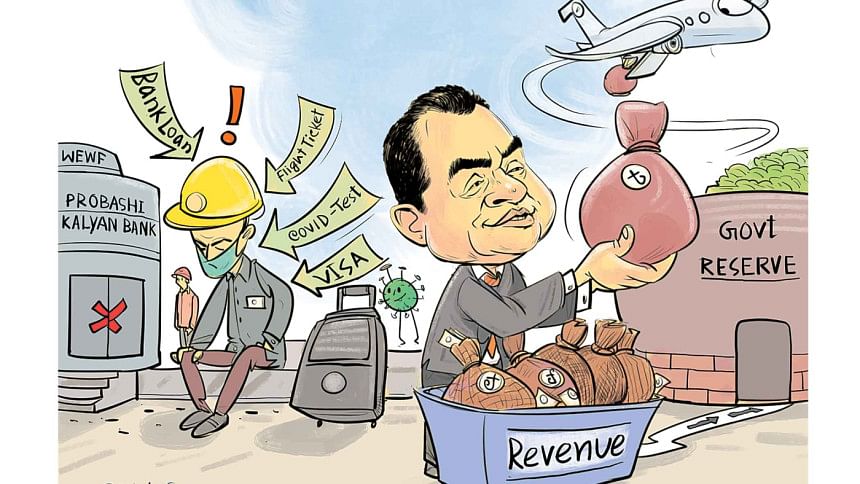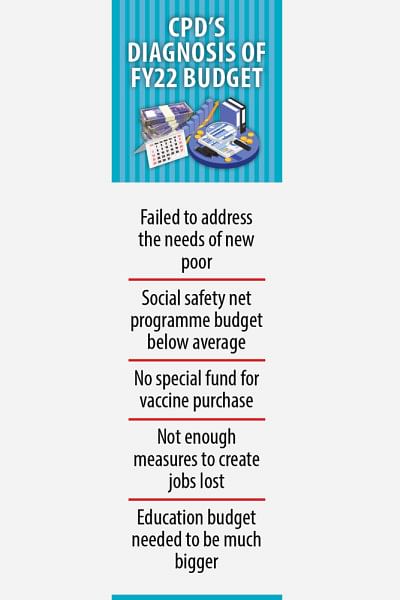Legalising black money: Kamal drops hints of continuation

The controversial move to legalise untaxed money with ease, which was absent in Finance Minister AHM Mustafa Kamal's proposed fiscal measures for the next financial year, might continue, after all.
"If [the step] is profitable, we will try to continue it. We will see one more month before taking any decision," Kamal said at a post-budget media briefing yesterday.
The option to legalise untaxed income was always present in some form but in June last year, Kamal had expanded the ambit for it.
At present, black money can be whitened by investing it in any sector and without facing any questions on the source of the funds. This opening is due to close at the end of the current fiscal year on June 30.

On May 19, Kamal said the opportunity would be there as long as undeclared income exists, drawing flak from economists and anti-graft campaigners.
"When I made the comments [two weeks ago], we had no information about the people who got the benefits. Some are in favour of it, and some are against it. Some have phoned me to say equitable justice can't be ensured in the society if the provision continues."
He said he was not sure yet if the undisclosed money was being used in the economy.
"If the money or income is disclosed, it will have a long-term multiplier impact on the economy. These people will invest the money in the economy. We have to do more work on this."
The finance minister defended the budget for the next fiscal year that proposed several measures to support domestic manufacturing industries and local business, but had hardly anything for the new poor, for social safety net protection, the health and education sectors.
Corporate taxes have been slashed, VAT exemptions have been expanded, minimum and advance taxes lowered, and the duty on raw material imports have been cut.
"Thanks to the tax measures, businesses will produce more and create more jobs. The tax measures will attract more investment. This will boost collection. We will be a winner. This will be a win-win situation."
The measures would help the economy hit its growth target of 7.2 percent, he said.
"All other economies have suffered. Our economy has never contracted. We are always advancing. If you look at the figures for all years, except for the pandemic-hit one, our GDP growth was higher than the previous year. We have achieved whatever we have said in the past."
But everything rests on how fast the fight against Covid-19 is won.
Stressing the role of the health sector in this regard, he said, "We have to manage it now effectively, efficiently and comprehensively."
In the proposed budget, Tk 14,200 crore has been allocated for procuring vaccines, and the amount can be raised by diverting funds from other sectors.
"We aim to bring all of the population under the vaccination programme. We are ready for that. We have allocated the resources. We will do whatever we need to do."
The government would have to bring changes to its plan for sourcing vaccines, instead of relying on only one source.
"We are already exploring alternative sources, and the vaccines will come from those sources," Kamal said.
At the briefing, Abdur Rouf Talukder, senior secretary of the finance division, said there was no problem with the allocation in the health sector as a portion of it remained unspent in the current fiscal year.
The full amount could not be spent because of problems in the procurement process and the inexperience of the project directors.
"We will address these two issues in the next fiscal year. We have already spoken to the health ministry about it, particularly about procurement."
The procurement in the health sector was supply-driven.
"We will make it demand-driven in the next fiscal year," he said.
The project directors in the health sector lacked experience in project management and procurement of this scale and urgency, according to Talukder.
"They will be given a crash course," he added.
In the budget documents, Kamal could not provide the updated data on the poverty rate. Instead, he maintained the 2019 estimated poverty rate of 20.5 percent.
Yesterday, he said Bangladesh Bureau of Statistics (BBS) will come up with the figure, and it is working on it.
Referring to a survey by Bangladesh Institute of Development Studies, Kamal said the upper limit of the poverty rate stands at 26 percent.
"Our task is to help the poor. The prime minister's instruction is to find out all of the marginalised segments and integrate them in the mainstream economy."
He went on to cite the government's initiative to build homes for the poor as a case in point.
"This is an excellent initiative. The government is building homes with its own money... You will not find any such example in any other country. We will do this for all the homeless people. The work is going on in full swing."
The government had not explored fiscal measures when it came to unveiling stimulus packages, he said.
"We have so far relied on the monetary policy. Now, we are going to explore the support that fiscal measures can offer."
The finance minister went on to describe the budget for fiscal 2021-22 as expansionary.
"We were able to go for an expansionary budget because of our low debt to GDP ratio. Many countries don't have that scope."
Bangladesh's debt-to-GDP ratio stands at 40 percent.
"If we can use the money, we will be able to save both lives and livelihoods," Kamal said, adding that it would not take long to bring down the budget deficit.

Planning Minister MA Mannan said the government was using the same sources to finance the budget deficit.
"The credit market is good. Our repayment record is good," he noted.
Bangladesh Bank Governor Fazle Kabir said the central bank would design the monetary policy in keeping with the expansionary budget.
About Tk 76,450 crore would be borrowed from the banking system to finance the budget deficit.
There was excess liquidity of Tk 200,000 crore in the banking system, which includes Tk 40,000 in cash liquidity. The rest are in the form of investment in bonds, Kabir added.
Talukder made mentions of the government's stimulus packages involving Tk 128,441 crore -- Tk 90,000 crore being channelled through the banking system and the remaining Tk 38,441 crore through budgetary allocations.
The government is providing from the budget Tk 4,500 crore as the interest subsidy every year for the loans provided by banks under the stimulus packages.
"So, the implementation of the stimulus packages has not been imposed on the banking system. The government is also sharing its fair share of the burden through the interest subsidy," Talukder said.
The 23 stimulus packages would continue until they are fully implemented. "The honourable prime minister has said she would come up with more stimulus packages, if needed," he added.
Shamsul Alam, a member of the General Economics Division, said there was nothing to be worried about the revenue generation.
Agriculture Minister Muhammad Abdur Razzaque said the government plans to commercialise agriculture and support farm mechanisation so that the cost of production goes down.
"Because of the higher labour cost, the profit for the farmers is not much."
The commercialisation of agriculture would generate higher incomes and create jobs in the rural areas, he added.
Mashiur Rahman, economic affairs adviser to the prime minister, said the government did not have to present a budget in a challenging situation like the one the country was in now.
Abu Hena Md Rahmatul Muneem, chairman of the NBR; Md Ashadul Islam, senior secretary of the Financial Institutions Division; and Fatima Yasmin, secretary of the Economic Relations Division, also attended the virtual briefing.

 For all latest news, follow The Daily Star's Google News channel.
For all latest news, follow The Daily Star's Google News channel. 



Comments